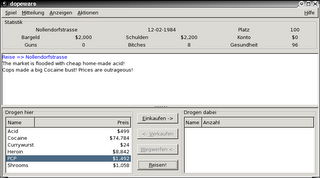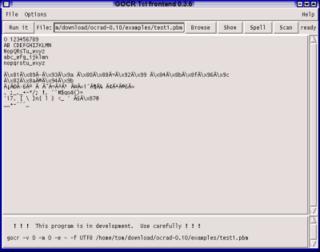Thursday, March 01, 2007
Privoxy
The only thing to take care of is to add a system user and group "privoxy" before you go on.
Then just add /opt/sfw/bin and /usr/sfw/bin to your PATH, if you have not already done so; export MAKE=/usr/sfw/bin /gmake and run the config scripts:
If you are impatient and are runing gmake, without wasting a thought on ./configure you will get tought that you'll have to run autoheader and autoconfig first - they should be in /opt/sfw/bin, otherwise run autoheader and autoconfig, ignore the cgwin warnings and run gmake all install.
Privoxy should autoconfig smoothly (it should find the right architecture, OS version and even the right thread model immediately, without complaining about pthreads or as ar many other native Loonix apps do) and build itself in /usr/local.
That´s it.
Friday, May 12, 2006
Dopewars

I don't know, how many years I have been playing and most of the time running
a persistent Dopewars-gameserver on Linux, BSD and now Solaris- for this simple but afflictive game. I even have a Java port
of Dopewars on my cell phone
With a little help :
./configure MAKE=gmake AR=gar
gmake MAKE=gmake AR=gar
gmake install
the sources compile fine
on a UltraSparcIII, Solaris 10 and gcc from the companion CD. Sound, GUI, Server and Game - everything.
Sunday, March 12, 2006
gdm, once again
- separate BNC-connectors for R,G,B,Sync and whatever SGIs need an extra wire for
- huge sync ranges
- stereo capabilities
I had it connected to a SGI Octane before - so the videomodes shouldn't be any problem.
Acoording to
Developer's Quarterdeck Log: Changing the Solaris Login Screen,
gdm2 is not a problem, too. I have been usig GNOME for about eight years now as my favourite desktop, and I really hope so. Messing around with [G|K|X]DM drove me nuts several times...
Sunday, March 05, 2006
FreeMind

I admit, I first thought that "mindmapping" was some kind of esoteric wellness hype for bored dentist's wives - I know this proves me rather ignorant than sceptic. Forunately I am sceptic enough to mistrust my own sceptiscism and sometimes force myself to try out things that appear "esoteric" to me. Such as Freemind, a Java based mindmapping tool, which turned out to be extremely useful, easy to handle and not esoteric at all. En contraire, Freemind is a very logic and systematic tool - it even forces "hackish" natures to think in an effective and even reproduceable way - more: I'm actually even having fun in planning projects or concepts step-by-step, while creating a presentable concept that I can mail to collegues or customers immediately. Any time I did so, they called back the same morning, telling me how interesting my concept seemed and if I just had the time to explain some details - much better than the "canonical" way, annoying them for weeks util they are willing to listen to some endless and hard to understand Geekspeek.
Long talk short end: Freemind is open source, the full package is 8MB small and will run under a recent JRE. Sun's actual JDK will do fine - you might have to start freemind.sh rather from a ksh than from sh or bash.
BTW: The screenshot above shows the layout for a video installation I will run together with two other VJs on Saturday March 11th in a Berlin club.
mindmapping, Freemind
Saturday, December 10, 2005
Things that get alive (as I connect them)

Some additional and removable hardware I have connected to my box (a Sun Blade 1k)
USB
- Hub: noname 4 port (vendor id:03eb, product id: 3301)
- Mouse: Logitech Optical
- Card-reader: SMSC USB97C223, labelled "Hama 6xUSB" working with all card types
- Memory-stick: any class 1 flash mem will do
- Camera: Nikon FinePics 4200 in mass storage mode
- IDE-USB: portable HDD (actually "on the road", feel free to ask me for the type)
- Soundcard: Terratec Aureon 5.1 USB (I submitted this one into the official Solaris HCL)
- Lamp [SCNR]
FireWire
- Philips DVD-burner in 'Digitus' IDE to IEEE1394 case
- DDS2-Tape: HP JetStore 6000 AKA C1533
- Scanner: HP ScanJet 4c/t
Solaris DVD-burning Solaris+FireWire
Hardware
Thursday, November 17, 2005
jEdit
Monday, October 10, 2005
gocr, XSane and OCRAD

I could score an aged HP-ScanJet 4c/t SCSI-Scanner at eBay for almost no money. It was recognized by Blastwave's XSane after I composed the following /kernel/drv/sgen.conf
device-type-config-list="scanner", "processor";
inquiry-config-list= "HP", "C2500A",
"HP", "C2500A 3332";
name="sgen" class="scsi" target=2 lun=0;
sgen-diag=1;
and symlinked /dev/scanner against /dev/scsi/processor. (I know this is evil Linux-style - but Xsane wanted to have it ;) ). Now I had my scanner working - and it works really fine. Way better than the cheap USB-scanner at my girlfriend's PeeCee, but still I had no OCR. Blastwave had no package, nor has SUN's companion software service , nor Sunfreeware.com.
On Sourceforge, I found GOCR, which compiled flawlessly with gcc and automake 2.59 from Blastwave. I had a look then at GNU GNU is UNIX, sometimes, at least after gcc has been over the sources. I had some minor difficulties, compiling OCRAD, the latest version will not compile under Solaris/gcc-3.4.3 -
main.cc:194: error: `snprintf' is not a member of `std'
I am not familiar enough with C++ to find out how to fix this - looks like a classpath issue to me. But I managed to compile OCRAD v0.10. I'll try to find out what the fsck is with 0.12 and try to build it. Meanwhile you will find binaries of gocr and gocr.tcl built with gcc 3.4.3 on a SUN Blade1000 (UltraSparc III) under Solaris10 here, and OCRAD there.
P.S.: Seems like OCRAD beyond 0.10 won't compile under Solaris because the author used a non-standard C++ function, which is wrapped by Linux' glibc but not by Sun's. I used gcc and the standard GNU libs -I intended to build an OpenSolaris package- but no luck. The discussion on bugs_ocrad at gnu.org do not look as if this going to resolve by any chance. :(
There goes interoperability. That really pisses me off in some way - I mean this incompatibilty would have been easy to avoid, but it doesn't happen IMHO because of personal vanity.
Solaris+OCR GNU
